
Tobacco industry giant R.J. Reynolds has filed a U.S. International Trade Commission (ITC) complaint, charging multiple manufacturers, distributors and retailers of the most popular disposable vapes with unfair imports. The action follows other Reynolds efforts this year to stem the tide of disposable vapes that compete with its Vuse products.
The ITC has not yet taken action on the complaint. Vaping360 has obtained a copy of the document, which was filed Oct. 13.
Reynolds is asking the ITC to investigate and issue an exclusion order preventing further U.S. imports of the disposable vaping products in question, and to issue a permanent cease and desist order prohibiting the named businesses and their “affiliated companies or divisions” from importing, distributing or selling any of the “accused products.”
Should Reynolds succeed, the market for flavored vaping products that people like could fully shift from a gray market (products sold in legal retail stores; taxes paid) to an underground black market (fully illegal and unreported).
Reynolds wants to cut off Vuse competitors at the border
The businesses named in the complaint—referred to by Reynolds as “peddlers of illegal disposable vapes”—are manufacturers, importers, distributors and retailers of Breeze, Elf Bar, Esco Bar, Hyde, Puff Bar, and R&M disposable vapes.
Included among the companies named in the complaint are several well-known U.S. wholesale and retail sellers of disposable vapes, including Element Vape, Flawless Vape, Magellan Technology, Mi-One Brands, Price Point Distributors, and Vape Sourcing.
The ITC complaint accuses the respondents of importing “illegal disposable vapes” in violation of Section 337 of the Tariff Act of 1930. Specifically, Reynolds claims the named businesses either falsely advertised that their products are authorized for sale by the government, failed to comply with federal laws imposing registration and reporting requirements and limitations on sales, or violated customs laws and regulations.
R.J. Reynolds owns mass-market vape brand Vuse, which sells the single most popular convenience store vape, the Vuse Alto. Last week, the FDA issued a marketing denial order (MDO), ordering Alto menthol refill pods off the market. The Alto device and tobacco-flavored pods are still under review by the agency. Two older Vuse vapes, the Solo and Vibe models (and their tobacco-flavored refills) are among the six currently sold vape devices authorized by the FDA.
In its complaint, Reynolds claims that, should the agency ban the competition, Reynolds and its Big Tobacco brethren are capable of picking up the slack. “Reynolds has the capacity to replace any increase in demand if the Accused Products were excluded from importation,” says the ITC complaint. “Reynolds is willing to meet any increased demand and can do so in a commercially reasonable time, given that it already supplies the industry with significant quantities of ENDS products, as well as oral tobacco and nicotine products.”
Reynolds’ desperate war on disposable vapes
The action is the latest in Reynolds’ campaign to eliminate growing competition from disposable vapes in the convenience store/gas station segment of the vaping products market. Both Reynolds and its parent company British American Tobacco (BAT) have taken extraordinary steps this year to attempt to cripple the upstart vape competitors:
·In February, Reynolds filed a formal citizen petition, asking the FDA to change its enforcement guidance to target disposables.
·The company suggested in its FDA petition that disposable vapes could be “laced with fentanyl.”
·After disposable manufacturer IMiracle rejected BAT’s bid to buy its Elf Bar brand last year, BAT tested Elf Bars’ volume and provided the data to UK Trading Standards teams, hoping to encourage enforcement actions. BAT then sent letters warning retailers of “the risks of corporate and personal liability arising from the sale of non-compliant products.”
·Soon after filing its FDA petition, a U.S. House bill was introduced that would require the FDA to update its vaping product enforcement guidance to specify “how the agency will prioritize enforcement against disposable ENDS products.” Tobacco control groups—usually behind such efforts—say they believe R.J. Reynolds was behind the legislation.
·Around the time Reynolds filed its citizen petition, a weird campaign against disposable vapes was launched by an advocacy-for-hire group called Consumer Action for a Strong Economy (CASE). Aside from its website trumpeting the risks of disposables and praising the FDA for enforcement actions, CASE also drove a truck around Washington, D.C., carrying huge signs with anti-disposable messaging. It is widely believed Reynolds is behind the CASE campaign.
·Reynolds has sent threatening letters to vape shops and other retailers, suggesting that selling unauthorized vapes could result in prosecution under state laws and lawsuits by Reynolds.
R.J. Reynolds and British American Tobacco still make the bulk of their profits from the sale of combustible cigarettes.
